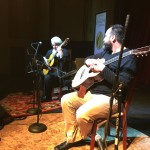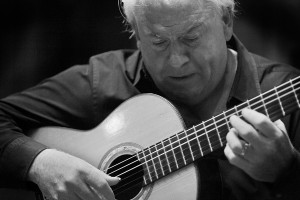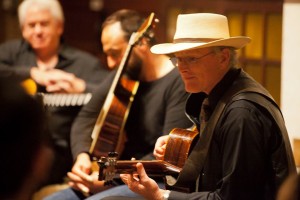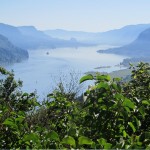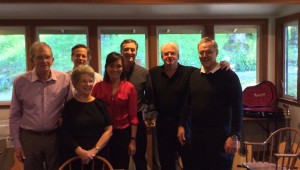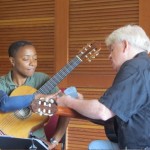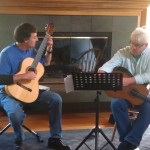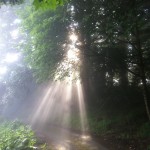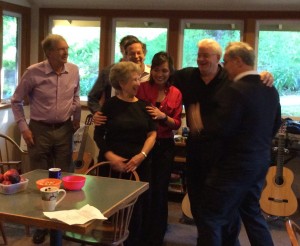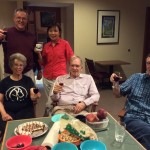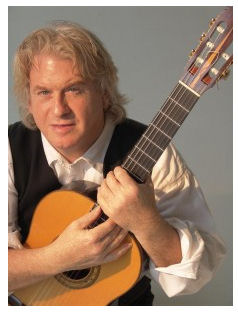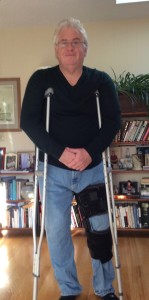 My four month hiatus from playing taught me a lot about the guitar. Since my methodical return I have gained new technical, musical and performance skills. I hope guitarists, and perhaps even non-guitarists find these posts worth following. Guitarists who want to improve their technique as well as musicianship and performance skills should apply themselves as instructed in this three-part series.
My four month hiatus from playing taught me a lot about the guitar. Since my methodical return I have gained new technical, musical and performance skills. I hope guitarists, and perhaps even non-guitarists find these posts worth following. Guitarists who want to improve their technique as well as musicianship and performance skills should apply themselves as instructed in this three-part series.
Each part of this series will include one chapter from my three part method for classical guitar. In Phase I Primary Skills for the Classical Guitarist devotes over thirty chapters to positioning, movement and movement forms for the classical guitarist. Phase II Secondary Skills covers additionial skills, often the ones that differentiate more professional level playing from novice playing. And Phase III Practice Directives covers repertoire practice directives that will aid in increasing musicianship, technique, memory and performance skills. Each chapter will eventually include introduction and practice-along-with-Scott videos. While my Private and Independant Studies students currently have access to all three parts of my method all will be available to the general public in early 2017.
At the beginning of January 2015 I took a nasty fall off some stairs, landing on a sharp object which caused my patella tendon to tear and my quad muscles to rupture in my left knee. My recovery was as the doctors promised – long and painful. I was unable to practice, mostly due to lack of mobility and pain, finally returning to the practice room for short spurts of work 5 months later in late May.
A few months ealier I had begun to work on vocalizing my pieces, (the subject of this article) but as I hit the guitar I studied my technique carefully through technical exercises and a new set of Carcassi and Sor study pieces. Only returning to concert repertoire in the fall of 2016. In the process I’ve bettered my technique, musicianship and performing skills. I’m playing at my best and with more confidence than ever. I also gained a deep gratitude for the skills and career that I worked so hard to achieve.
These gains are not the result of any new information but the application of what I already knew and from my method. But now I had the luxury of time. My wonderfully supportive wife encouraged me to take a full year before taking on responsibilites of performing. And so in each of the phases I worked I was able to do so with more time and focus. In this three part series I want to share with you what I discovered.
Musicianship
My accident robbed me of my old life, housebound as it were but not playing guitar was the hardest; this was my first abscence for over 51 years. And I knew I was a few months from getting back in the practice room. As the medications wore off it became apparent that I needed to do something. If not  playing perhaps I could learn to sing my pieces. I began conducting and sight-singing my scores. I downloaded a piano app to my ipad to help with starting pitches and to help recover any notes in question. (I also downloaded a harpsichord app for my baroque works). I began to notice I was singing phrases differently from the way I remembered playing them. Soon I began recording my sessions and marking my scores accordingly. As I continued to listen, critique and refine I eventually was able to ‘perform’ a number of works with clear and new interpretations, from memory without the guitar! I felt like I was on to something new and exciting. Of course I had sung through parts of pieces before but this was different, somehow having no access to the guitar forced me to think more clearly about my musical choices and overall interpretation. I felt like I owned the score musically with compete interpretations. I came to call this my ‘musical map’. Like a map it became a guide for how I wanted to interpret the composers intensions. I remember some of my happiest days reclined on my deck with the sun and breeze in my face, internally hearing and performing my repertoire; three movements from the Bach’s 1st Cello Suite, some studies by Carcassi and Tarrega’s Capricho Arabe. It’s hard to explain how meaningful and fulfilling this felt. The music was nurturing my soul back and even though singing my repertoire came very close to the satisfaction recieved from actually playing I couldn’t wait to feel the touch of my strings.
playing perhaps I could learn to sing my pieces. I began conducting and sight-singing my scores. I downloaded a piano app to my ipad to help with starting pitches and to help recover any notes in question. (I also downloaded a harpsichord app for my baroque works). I began to notice I was singing phrases differently from the way I remembered playing them. Soon I began recording my sessions and marking my scores accordingly. As I continued to listen, critique and refine I eventually was able to ‘perform’ a number of works with clear and new interpretations, from memory without the guitar! I felt like I was on to something new and exciting. Of course I had sung through parts of pieces before but this was different, somehow having no access to the guitar forced me to think more clearly about my musical choices and overall interpretation. I felt like I owned the score musically with compete interpretations. I came to call this my ‘musical map’. Like a map it became a guide for how I wanted to interpret the composers intensions. I remember some of my happiest days reclined on my deck with the sun and breeze in my face, internally hearing and performing my repertoire; three movements from the Bach’s 1st Cello Suite, some studies by Carcassi and Tarrega’s Capricho Arabe. It’s hard to explain how meaningful and fulfilling this felt. The music was nurturing my soul back and even though singing my repertoire came very close to the satisfaction recieved from actually playing I couldn’t wait to feel the touch of my strings.
Eventually working my new interpretations into my hands was something I would do months later and subsequent performances were transformed not only by my new found musical map but also from the welcomed absence of internal interference. Gone were the distractions, replaced by a wonderful duet playing between my hands and my ears. Stay tuned for Part 3 and you’ll see how this works.
What follows is a chapter I wrote from this experience that will be in my upcoming method Phase III, Practice Directives for the Classical Guitarist on Vocalization.
Phase III, Part 4 – Chapter 5 Vocalization
The Practice Directive that follows is a thorough training in vocalization and creating a musica map. This can take well up to a month or six weeks to complete. Once completed subsequent vocalization exercises will become easier. Eventaully you’ll be internally singing everything you play; from scales to your concert repertoire pieces. And thats a good thing!!
Chapter 6 – Vocalization
Weeks to Completion: 4
Number of Practices in Two Week Cycle: 10
Time per Practice Session: 15 minutes
Repertoire Demand Level: 5 and below
In this practice directive, you’ll learn to vocalize and develop a personal interpretation or musical map of the music.
Too often, musicians interpret in reaction to the music, without thought to musical form or phrasing. A purely reactionary approach may seem more intuitive and thus easier, individualistic, or creative. But the approach is misguided. First, it takes too little of the composer’s intentions into account. A higher art form is reached when player and composer unite in an understanding of form and expression. Secondly, because the reactionary approach is based on one’s ever-changing and subjective reactions to the music, it introduces inconsistency and uncertainty, which can increase anxiety in performance. As a reactionary interpreter, you can also find yourself focusing on smaller musical figures instead of on overall phrasing. Focusing on smaller figures can cause distractions and increased anxiety. Adhering to a mapped interpretation allows you to focus on the big picture, making performing much easier.
In The Inner Game of Music (2011), author Barry Green states, “When you can hold the sound and pitch of the music clearly in this way, performing it accurately becomes easier. Your body has a sense of its goal. Effectively, you are playing a duet between the music in your head and the music you are performing. Any notes you play that don’t correspond to your imagined sense of the music stand out, and your nervous system is able to make instant, unconscious adjustments.” (p 60)
Following a musical map gives you a feeling of finality and a benchmark for how you want to continue to practice and perform the work. If those weren’t enough reasons to look askance at the intuitive approach and take a more consistent interpretive approach, imagine the joy that comes from the connection made between you and an audience as a result of your confident expression of the composer’s intentions.
There are two stages to this practice directive: vocalization and integration. In the vocalization phase, you learn to sing the melody a cappella, only using the guitar to check pitches. It is in this phase where you develop your interpretation. The ‘integration’ consists of playing your interpretation on the guitar. Throughout the vocalization and integration phases, record yourself for review and refinement purposes.
Vocalization can be an intimidating process, but it needn’t be, as we’re not concerned with singing perfectly in tune. Be less concerned about how you sound and more concerned with what you hear. Let’s practice hearing.
Below, find the song “Beautiful Dreamer” by Stephen Foster (Example 1). Sing it in your head first. You can likely imagine the melody quite well. Now, sing it out loud. After a few audible attempts, sing it back in your head. It should be clear that you can recall and internally sing the familiar tune Beautiful Dreamer.
Example 1

What follows is a quick tutorial to get you started. As you begin to sing these examples, don’t worry about singing perfectly in tune. While you want to hit the pitches (and playing along occasionally on the guitar can help with that), don’t be overly concerned with hitting the pitch perfectly in tune. It’s more important that you hear the pitches. Also, don’t worry about the exact range. If a voicing is too low or high, simply move it up or down an octave. Rhythm, on the other hand, should be strictly observed. While vocalizing, apply the conducting skills you learned in Part 4, Chapter 1.
Because you are only capable of singing one note at a time, you should focus on the melody. Melody is occasionally interwoven within an arpeggio pattern, as in Francisco Tarrega’s “Study No. 2” (Example 2).
Example 2

Example 3 shows the extracted melody from the same work. Try singing the melody, play along on the guitar if you need help.
Example 3

Here’s another example from Fernando Sor’s “Study in Bm”,(Example 4).
Example 4

Example 5 shows the extracted melody from the same eight measures. Sing the following.
Example 5

Occasionally, another voice asserts itself as an active voice. Active voices are those that are not melody, but are integral and can be sung with the melody. Consider Matteo Carcassi’s “Study No 3 in A minor,” a good example of a work with a melody and an active voice (Example 6).
Example 6
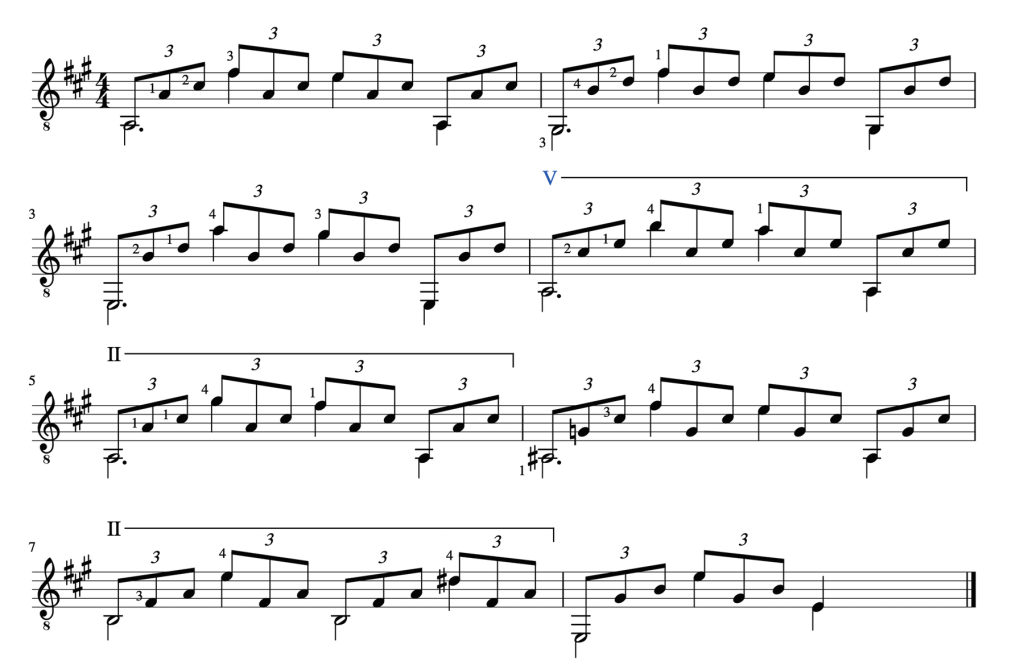
In Example 7, the melody is on top and an active voice is in the bass, both of which you can sing, since they don’t sound at the same time. Play and sing along. You may not have the vocal range to sing the notes at pitch. If needed, raise the bass an octave up, or the melody an octave down.
Example 7

Vocalization
Interpretation
For your first two weeks of practice, learn the notes that you’ll be singing. Extract the melody, as well as any other active parts you can sing. As you work through the vocalization phase, observe the phrasing by using the expressive tools of dynamics and tempo. Remember the concepts learned earlier in Part 4. If you’re not familiar with these chapters suffice it to say you’ll want to follow the contour of the melody with dynamics and rhythm, observe the arc of the phrases and sections. Try increasing your tempo and dynamics at the three quarter mark (or high point) of each phrase, and decrease your tempo and dynamics at the end of the phrases. As a few phrases make a section — and a few sections make an entire piece — you should begin to hear the relative high points in each phrase and section.
Eventually, you need to find what I call the ‘high’ point of the piece. This usually comes near the end. Everything builds to this moment, and this is where your tempo and dynamics should create the most tension. The expressive qualities should be relative to the level of tension and release created in each. This becomes the musical map I spoke of earlier.
Breadth in Phrasing
Phrasing owes its form to the characteristics of the human voice so it behooves you to use your breadth to aid in phrasing. Try to breathe when there are natural musical breaks — for instance, at the end of phrases. Observe these breadths in your interpretation as well. Your score should eventually use expressive and breadth markings.
Tempo
Melody helps determine tempo, so use the vocalization practice to learn the appropriate tempo for the piece.
Once you have a good feel for your interpretation, you can perform an internal vocalization anywhere: sitting outside, taking a walk, or even before you go to sleep. This in itself can be quite rewarding.
Remember to record, review, and refine your interpretation until you have your musical map memorized.
Integration
Once you have a recording of your memorized mapped interpretation, begin playing along on the guitar as you continue to sing internally. Internal singing is a critical bridge between these four weeks of practice where you should try to match the expressive qualities (rhythmic and dynamic) as well as the breath marks in your recorded vocalization. It’s critical that you record and review your playing of the piece to make sure that you’re getting all the expressive nuances you were able to sing. By the end of the last two weeks, you should be consistently internally singing along with your playing, observing your learned interpretation.
At this point you can also add timbre changes to your interpretation. Experiment with playing passages with ponticello (near the bridge) and tasto (above the soundhole) for further expression.
Just as you did a vocalization recording, now aim to get a recording of your playing that you consider a good representation of your final interpretation. Save that recording for future reference. From this point forward, always internally sing as you play the piece.
Maintenance Practice
When you cycle the piece back into your maintenance practice, always adhere to your interpretation as you apply other practice directives. You can also continue to internally vocalize your interpretation without the guitar, and occasionally review or revise your recording.
As your musical experience continues to grow, you may choose to alter your interpretation. Having laid the foundation, small changes will be relatively easy to implement.
Independent Study:
Send a recording of your vocalization and performance of the work on guitar.
Stay tuned for Part II!
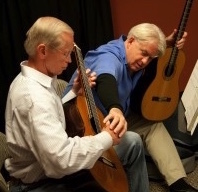 ur Monthly Master Classes will consist of 3 performers (there can be different performers each time) and up to 4 auditors. Both performers and auditors can be local or remote students. I’ll be keeping the classes small to allow for more attention to each participant. My hope is that each class consists of the same core people, month to month.
ur Monthly Master Classes will consist of 3 performers (there can be different performers each time) and up to 4 auditors. Both performers and auditors can be local or remote students. I’ll be keeping the classes small to allow for more attention to each participant. My hope is that each class consists of the same core people, month to month.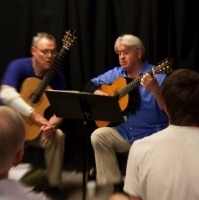 technique, performance anxiety, practice directives, or effective ways to practice. In many cases I’ll be able to provide you with written and video support materials to support what was covered in class. While these concepts will be directed towards the performers the auditors will be encouraged to choose 3 ideas covered in the master class to work on for the following class.
technique, performance anxiety, practice directives, or effective ways to practice. In many cases I’ll be able to provide you with written and video support materials to support what was covered in class. While these concepts will be directed towards the performers the auditors will be encouraged to choose 3 ideas covered in the master class to work on for the following class.
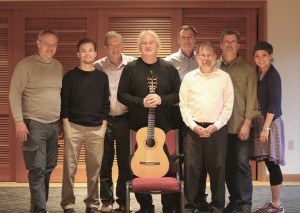
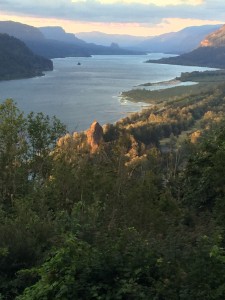 n CGI’s large private kitchen, on walks around the beautiful grounds or at the outdoor fireplace that overlooks the historic Columbia River Gorge.
n CGI’s large private kitchen, on walks around the beautiful grounds or at the outdoor fireplace that overlooks the historic Columbia River Gorge.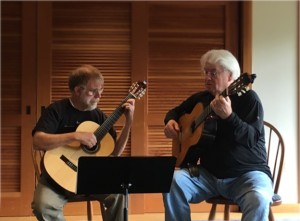 ctice and take a walk around the trails, shoot some hoops, play tennis or swim in the pool overlooking the gorge.
ctice and take a walk around the trails, shoot some hoops, play tennis or swim in the pool overlooking the gorge.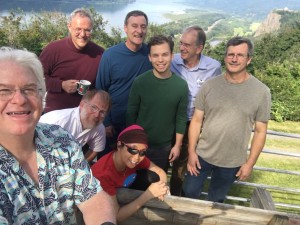
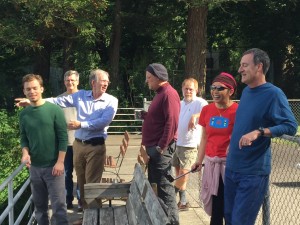
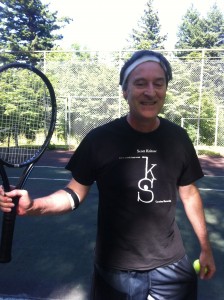
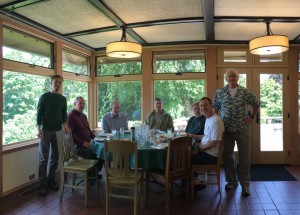
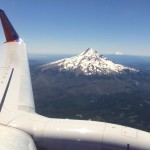
 My four month hiatus from playing taught me a lot about the guitar. Since my methodical return I have gained new technical, musical and performance skills. I hope guitarists, and perhaps even non-guitarists find these posts worth following. Guitarists who want to improve their technique as well as musicianship and performance skills should apply themselves as instructed in this three-part series.
My four month hiatus from playing taught me a lot about the guitar. Since my methodical return I have gained new technical, musical and performance skills. I hope guitarists, and perhaps even non-guitarists find these posts worth following. Guitarists who want to improve their technique as well as musicianship and performance skills should apply themselves as instructed in this three-part series.







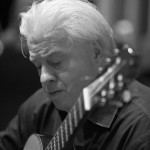
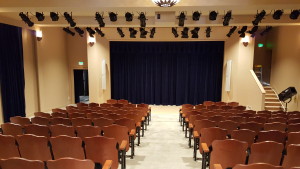
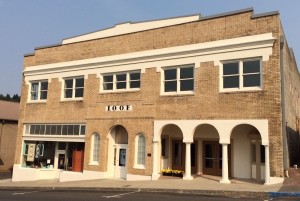
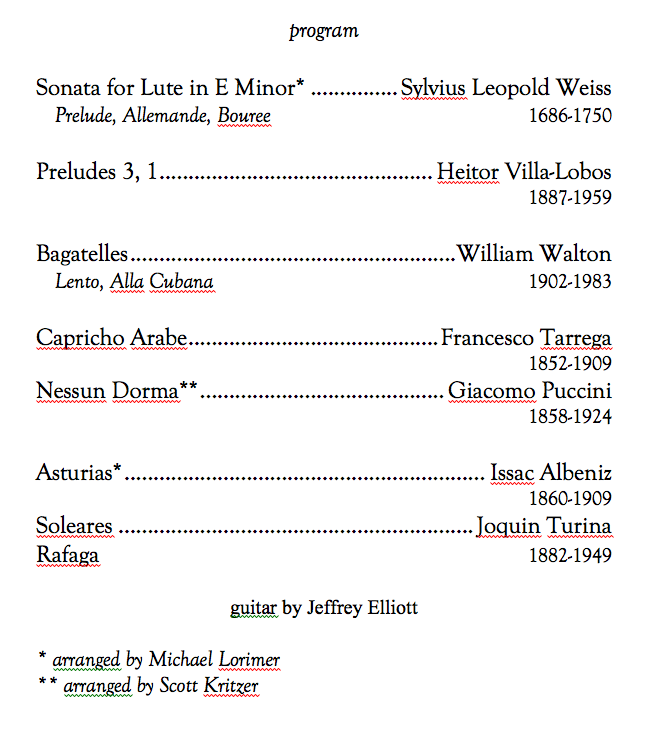
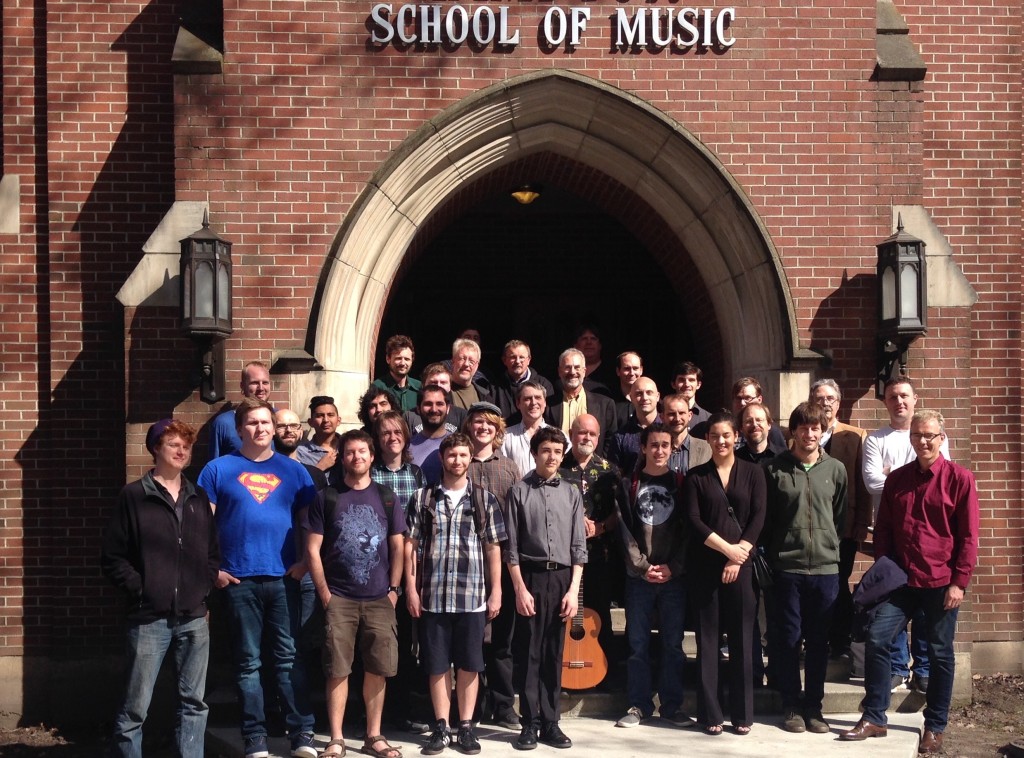

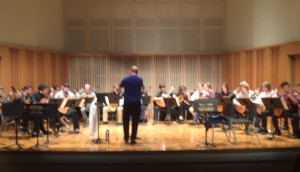
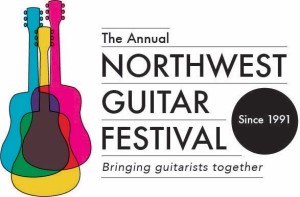
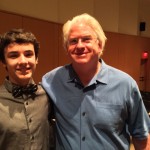
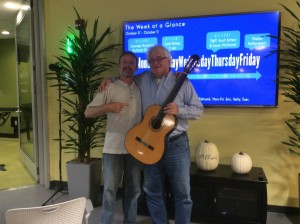 d conversation for members of an intimate studio audience.
d conversation for members of an intimate studio audience. 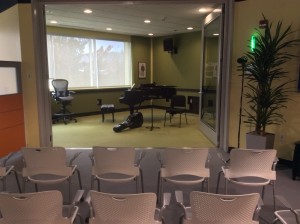 ce open this link (
ce open this link (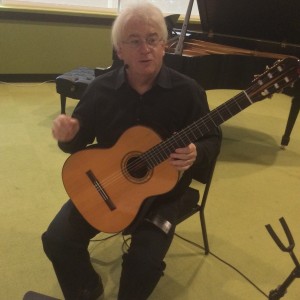 On May 12th I’ll be joining lutenist
On May 12th I’ll be joining lutenist 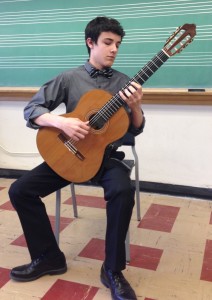
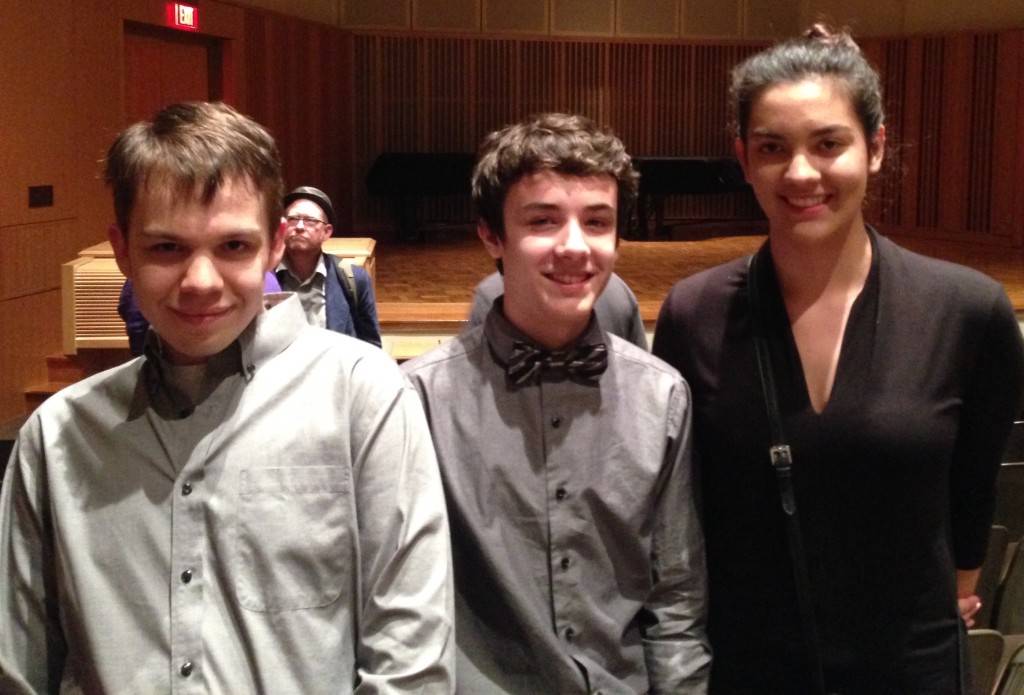
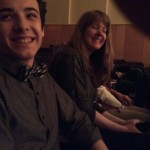
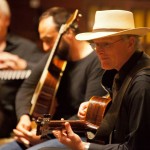
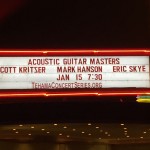 Acoustic Guitar Masters brings together fingerstyle, jazz and classical music in the hands of three masters of the instrument. AGM features jazz guitarist Eric Skye. finger style guitarist Mark Hanson and yours truly on the classical guitar.
Acoustic Guitar Masters brings together fingerstyle, jazz and classical music in the hands of three masters of the instrument. AGM features jazz guitarist Eric Skye. finger style guitarist Mark Hanson and yours truly on the classical guitar.